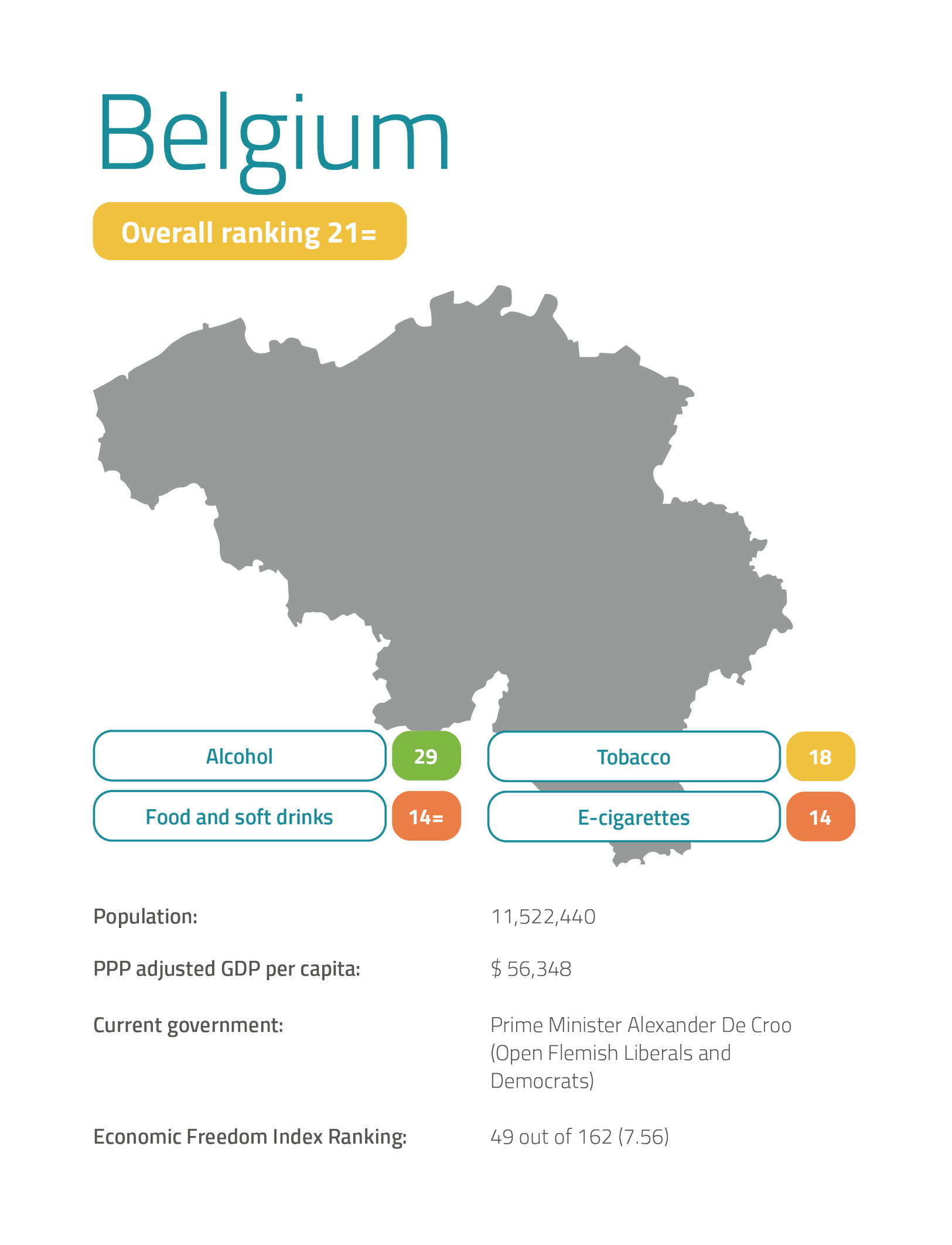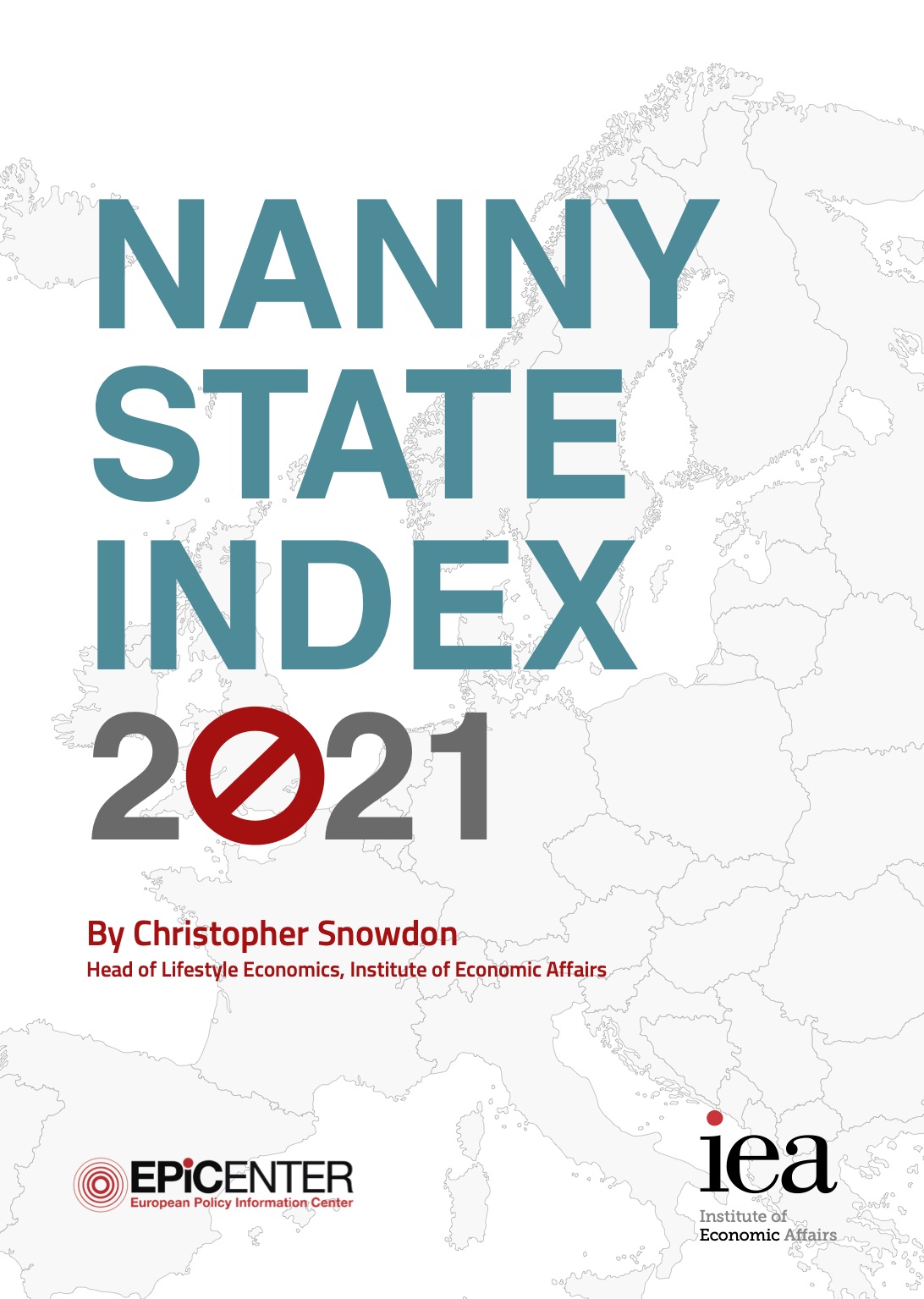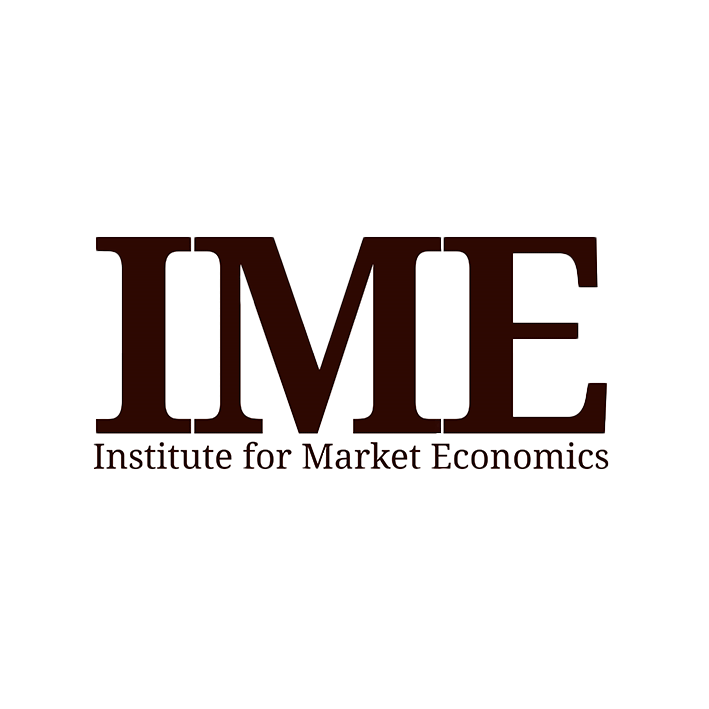
Belgium is average across every category except alcohol which it treats relatively liberally. It has low taxes on beer and its wine and spirits duty is not extortionate. Restrictions on alcohol advertising are modest.
Belgium’s smoking ban, like that of most EU countries, allows designated smoking rooms in most venues, including the European Parliament. By law, smoking rooms have to be quite basic, with no televisions or pool tables, for example. Cigarette vending machines are legal and there is no retail display ban.
E-cigarettes were legalised as consumer products in 2016, but internet sales and cross-border sales are banned and e-cigarette advertising is banned nearly everywhere. Nearly all tobacco advertising was banned in 1999, but a few exemptions were made for retailers. In January 2021, the last vestiges of tobacco advertising – including posters inside and outside of tobacconists – were banned. E-cigarette advertising is similarly banned entirely.
Plain packaging for tobacco products went into effect on 1 January 2020. Retailers were given a year to clear their branded stock. Belgium is now one of six EU countries to have experimented with this policy.
Vaping is banned wherever smoking is banned, with possible fines ranging from €208 to €8,000. This means it is illegal to vape in an e-cigarette shop. Vaping and smoking in a vehicle carrying a person under the age of 18 has also been banned since 2019. In December 2019, the Brussels city council approved a ban on drinking at any time of day in the central pedestrian zone. This was extended to a wider area in October 2020.
A tax on soft drinks of €0.03 per litre was introduced in January 2016 and has since been raised to €0.12 per litre. Although the government describes this as a ‘health tax’, it applies to drinks which contain no sugar or calories. The Belgian government now collects more revenue from the sugar tax than it does from wine duty.
Belgium has had legal limits on the amount of salt that can be put into bread since 1985 (two grams of salt per 100 grams of bread).
With thanks to Arnaud Sadzot
About
The Nanny State Index (NSI) is a league table of the worst places in Europe to eat, drink, smoke and vape. The initiative was launched in March 2016 and was a media hit right across Europe. It is masterminded and led by IEA’s Christopher Snowdon with partners from all over Europe.
Enquiries: info@epicenternetwork.eu
Download Publication

Previous version: 2019
Categories
About the Editor
Christopher Snowdon is the head of Lifestyle Economics at the Institute of Economic Affairs. His research focuses on lifestyle freedoms, prohibition and policy-based evidence. He is a regular contributor to the Spectator, Telegraph and Spiked and often appears on TV and radio discussing social and economic issues.
Snowdon’s work encompasses a diverse range of topics including ‘sin taxes’, state funding of charities, happiness economics, ‘public health’ regulation, gambling and the black market. Recent publications include ‘Drinking, Fast and Slow’, ‘The Proof of the Pudding: Denmark’s Fat Tax Fiasco’, ‘A Safer Bet’, and ‘You Had One Job’. He is also the author of ‘Killjoys’ (2017), ‘Selfishness, Greed and Capitalism’ (2015), ‘The Art of Suppression’ (2011), ‘The Spirit Level Delusion’ (2010), ‘Velvet Glove, Iron Fist’ (2009).
Belgium 2021

Belgium is average across every category except alcohol which it treats relatively liberally. It has low taxes on beer and its wine and spirits duty is not extortionate. Restrictions on alcohol advertising are modest.
Belgium’s smoking ban, like that of most EU countries, allows designated smoking rooms in most venues, including the European Parliament. By law, smoking rooms have to be quite basic, with no televisions or pool tables, for example. Cigarette vending machines are legal and there is no retail display ban.
E-cigarettes were legalised as consumer products in 2016, but internet sales and cross-border sales are banned and e-cigarette advertising is banned nearly everywhere. Nearly all tobacco advertising was banned in 1999, but a few exemptions were made for retailers. In January 2021, the last vestiges of tobacco advertising – including posters inside and outside of tobacconists – were banned. E-cigarette advertising is similarly banned entirely.
Plain packaging for tobacco products went into effect on 1 January 2020. Retailers were given a year to clear their branded stock. Belgium is now one of six EU countries to have experimented with this policy.
Vaping is banned wherever smoking is banned, with possible fines ranging from €208 to €8,000. This means it is illegal to vape in an e-cigarette shop. Vaping and smoking in a vehicle carrying a person under the age of 18 has also been banned since 2019. In December 2019, the Brussels city council approved a ban on drinking at any time of day in the central pedestrian zone. This was extended to a wider area in October 2020.
A tax on soft drinks of €0.03 per litre was introduced in January 2016 and has since been raised to €0.12 per litre. Although the government describes this as a ‘health tax’, it applies to drinks which contain no sugar or calories. The Belgian government now collects more revenue from the sugar tax than it does from wine duty.
Belgium has had legal limits on the amount of salt that can be put into bread since 1985 (two grams of salt per 100 grams of bread).
With thanks to Arnaud Sadzot

 Austria
Austria Belgium
Belgium Bulgaria
Bulgaria Croatia
Croatia Cyprus
Cyprus Czech Republic
Czech Republic Denmark
Denmark Estonia
Estonia Finland
Finland France
France Germany
Germany Greece
Greece Hungary
Hungary Ireland
Ireland Italy
Italy Latvia
Latvia Lithuania
Lithuania Luxembourg
Luxembourg Malta
Malta Netherlands
Netherlands Norway
Norway Poland
Poland Portugal
Portugal Romania
Romania Slovakia
Slovakia Slovenia
Slovenia Spain
Spain Sweden
Sweden Turkey
Turkey United Kingdom
United Kingdom


















